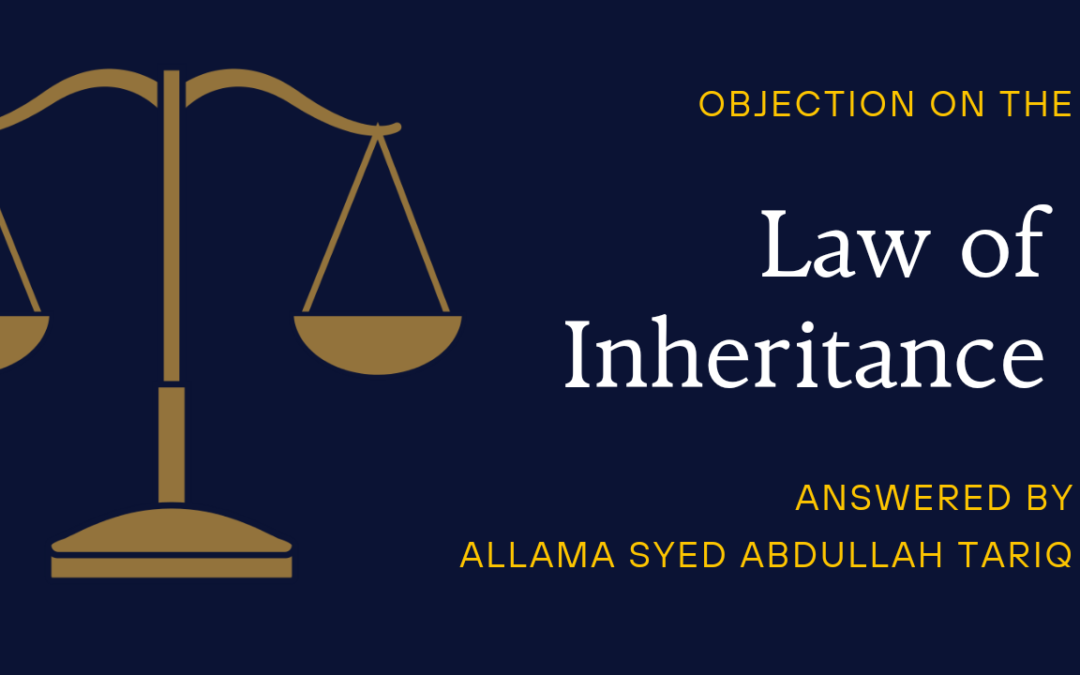Objection on the ‘Law of Inheritance’ answered by Syed Abdullah Tariq.
Objection by brother:
Similar mistakes you can see in the verse: Quran 4: 11 – 12, and Quran 4: 176 in inheritance law. In these verses one can see the total property after adding all distributed parties adds up more than the available property, i.e., totals become more than 1 which are: 1.125 and 1.25. How come? A gross mathematical errors, is not it?
According to the instruction given in Quran 4.11, 12 and 176, if a man dies and leaves behind a wife, three daughters and his two parents, His wife’s share of his inheritance is 1/8. (In what ye leave, their share is a fourth, if ye leave no child; but if ye leave a child, they get an eighth) His daughters would receive 2/3 (if only daughters, two or more, their share is two-thirds of the inheritance;) and his parents each will get 1/6 of his inheritance. (For parents, a sixth share of the inheritance to each, if the deceased left children;) When you add all these fractions the sum is more than the total of inheritance.
Wife1/8 = 3/24 Daughters 2/3 = 16/24 Father 1/6 = 4/24 Mother1/6 = 4/24 Total = 27/24
3 daughters both parents alive a wife then they will get
2/3 (2/9 each) 1/3 (1/6 each) 1/8 part according to
verse 11 verse 11 verse 12 which totals up to
2/3 + 1/3+ 1/8 = 1 + 1/8
The problem is not religious contradiction but inability to perform as dictated by Quran.
Quran asks Muslims to divide 1 (100%) into parts such that when all parts are added up, the answer should come 1+1/8 (112.5%). I will be happy to learn this kind of Mathematics as taught in Quran.
Reply by Syed Abdullah Tariq:
To understand and interpret the three Ayahas on inheritance (4 : 11,12,176), is very complex. The problem with those people who are objecting is that either they have no knowledge of Arabic language or they are intentionally misleading others. A number of rules of distribution of inheritance may be derived from the actual Arabic words. The translations do not reflect those subtle points from which the rules are derived.
All the shares mentioned in the three Ayahs are not calculated and distributed simultaneously. The rules relate to the calculation of different relationships in such a way that some calculations of shares of some take precedence over calculation of shares of others. There is no question of any difficulty in accurate distribution according to Ayahs of the Qur’an if the said rules are followed.
The mistake made by the objector is that he made all the calculations simultaneously without following the rules. One of the rules is that the share of the spouse of the deceased will be calculated and deducted from the property in the first instance. After deducting the share of the spouse from the amount/property, the shares of other inheritors will be calculated.
In the instance given by the objector, first of all, the wife’s 1/8 share will be deducted from the whole amount. Whatever is left will be divided in three parts. One of the three parts (1/3) goes to the parents and the rest 2/3 goes to the daughters. There is no question of any amount falling short.
To make it more clear, let us take an example based on the same inheritors as perceived above. A deceased left Rs. 1,44,000/- worth of cash/property to be distributed. First of all the wife gets 1/8 i.e Rs. 18,000/-. From the balance of (1,44,000 – 18,000) 1,26,000, the three daughters will get two third and the parents one third of this balance amount. So the daughters get 84,000 (28,000/- each) and the parents 42,000 (21,000/- each). Notice that the whole amount has been distributed as per directions of Qur’an and there is no discrepancy or shortage as the objector claims.
Wife’s 18000 + Daughters’ 84000 + Parents 42000 = 1,44,000/-

